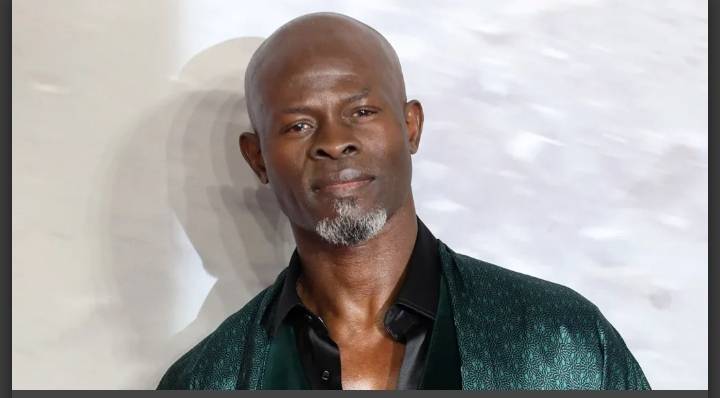Veteran actor Djimon Hounsou, known for his powerful performances in films like Blood Diamond and Gladiator, has opened up about the harsh realities of being a person of color in Hollywood. Despite a career spanning over two decades, two Academy Award nominations, and roles in blockbuster hits, Hounsou revealed that he still battles financial struggles and racial inequities in the film industry.
The 60-year-old actor, originally from Benin, shared his experiences during an interview on CNN’s African Voices Changemakers. His revelations shed light on systemic issues within Hollywood, particularly in terms of fair recognition and pay equity.
Struggling Despite Success
“I am still struggling to make a living,†Hounsou candidly admitted. “I have been in the filmmaking business for over two decades with two Oscar nominations and many blockbuster films, and yet, I am still struggling financially. I am definitely underpaid.â€
His statement comes as a stark reminder that even the most celebrated actors of African descent often face financial and professional hurdles that their counterparts might not encounter.
Reflecting on his early career, Hounsou spoke about his breakout role as Cinqué in Steven Spielberg’s 1997 historical drama Amistad. The role earned him widespread acclaim and a Golden Globe nomination, but he feels his performance was overlooked by the Academy Awards due to racial stereotypes and biases.
“I was nominated for the Golden Globe, but they ignored me for the Oscars because they thought that I had just come off the boat and the streets,†he said. “Even though I successfully did that, they just didn’t feel like I was an actor to whom they should pay any respect.â€
A History of Disparities
Hounsou’s grievances are not new. In a March 2023 interview with The Guardian, he expressed frustration over consistently being undervalued for his contributions to the industry. He recounted instances where he was offered significantly lower pay compared to his peers, even when he brought immense value to a project.
“I still have to prove why I need to get paid,†he explained. “They always come at me with a complete low ball: ‘We only have this much for the role, but we love you so much and we really think you can bring so much.’â€
Such experiences highlight the systemic issues of racial and financial inequality that persist in Hollywood, often leaving actors of color underappreciated and undercompensated.
Breaking Through Stereotypes
Born in Cotonou, Benin, Djimon Hounsou immigrated to France at a young age before making his way to the United States. His rise to fame was not without its challenges. In an industry where roles for Black actors have historically been limited and stereotypical, Hounsou’s talent and determination helped him carve out a space for himself.
In addition to his role in Amistad, Hounsou delivered a gripping performance in Blood Diamond (2006), earning him his second Oscar nomination. The film, which addressed the exploitation surrounding conflict diamonds in Africa, further cemented his reputation as a versatile and impactful actor.
Yet, even with such high-profile roles, Hounsou has struggled to break free from the limitations imposed by systemic biases in Hollywood.
Racial Challenges in Hollywood
Hounsou’s experiences reflect a broader issue within the entertainment industry: the underrepresentation and underpayment of Black actors. While Hollywood has made strides in promoting diversity in recent years, many believe that progress has been slow and often superficial.
The actor’s candid remarks underscore the need for a more equitable system that recognizes and rewards talent regardless of race.
“I am not the only one going through this,†Hounsou said. “There are so many of us who feel marginalized, undervalued, and unseen. It’s not just about money; it’s about respect and acknowledgment.â€
A Call for Change
Hounsou’s revelations have sparked conversations about the systemic challenges faced by actors of color in Hollywood. Fans and advocates have called on the industry to address these disparities and ensure that all actors receive fair treatment and compensation.
Social media has amplified Hounsou’s message, with many expressing outrage over the injustices he has faced. Supporters have called for greater transparency and accountability in how actors are compensated and recognized for their work.
“Djimon Hounsou’s story is a wake-up call for Hollywood,†one Twitter user wrote. “It’s time for the industry to put its money where its mouth is and show true commitment to diversity and equity.â€
Looking Ahead
Despite the challenges, Hounsou remains committed to his craft and to advocating for change. His story serves as a reminder of the resilience and determination required to succeed in an industry that has historically marginalized certain groups.
As the conversation around equity in Hollywood continues, Hounsou’s experiences highlight the importance of creating an inclusive environment where all actors can thrive. His journey, marked by both triumphs and struggles, stands as a testament to his unwavering dedication to his art.
While the road ahead may still be fraught with challenges, Hounsou’s voice adds to the growing chorus demanding fairness and respect in Hollywood. As fans and industry stakeholders rally around his cause, there is hope that his story will inspire meaningful change, paving the way for a more equitable future in the entertainment world.



No comments yet
Be the first to share your thoughts!